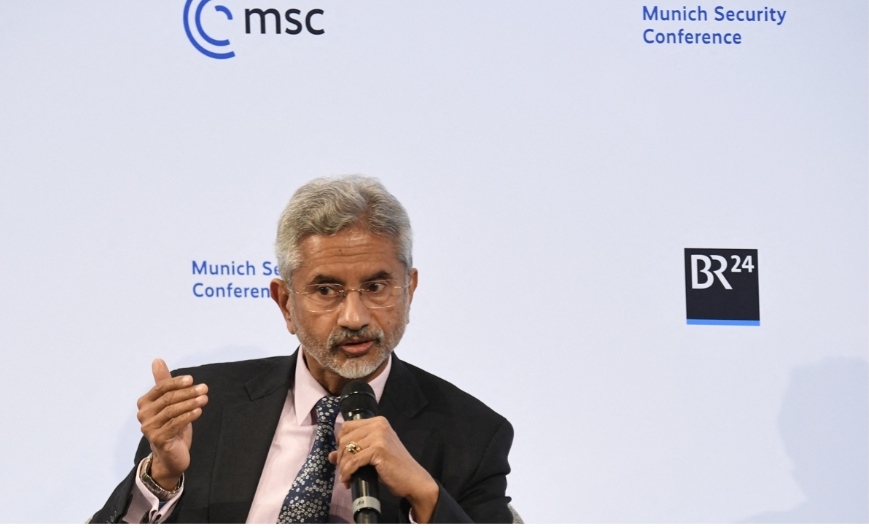Speech Of Shri Jaishankar Being Hailed In China

Indian Foreign Minister Subrahmanyam Jaishankar speaks on stage during the 58th Munich Security Conference (MSC) in Munich, southern Germany on Saturday.
While speaking on June 3 at the Globsec 2022 Forum in Bratislava, Slovakia, India’s External Affairs Minister Dr S. Jaishankar came down heavily on Europe—not only did he refute the criticism against India’s purchase of Russian oil, but also insisted that India could well manage its foreign policy on its own, refusing to act according to any pressures imposed on it. Jaishankar argued that the world cannot be as “Euro-centric” as it was in the past. Soon, his tough albeit witty words generated a significant fan following even among Chinese netizens and media. And here is why:
Jaishankar was indignant for a good reason. The session was themed “Taking Friendship to the Next Level: Allies in the Indo-Pacific Region,” but it ironically spent all 28 minutes talking down to and criticizing India. The interviewer acted in a condescending manner, and sought to push around India on issues concerning Russia and China, than valuing India on its own merits.
The interviewer first grilled Jaishankar on India’s increased oil imports from Russia. The latter fought back saying that if Europe could buy Russian oil so could India, alluding to West’s hypocrisy.
When India was told off for its moral ambiguity, Jaishankar fought back with down-to-earth pragmatism. He rightfully turned an India-versus-Europe argument into a classic North-versus-South one. By speaking out on behalf of the more economically vulnerable developing countries, Jaishankar groomed India as the champion of the Global South which underwrote free flows of affordable oil and wheat. India’s plain pragmatism contrasted sharply against high-sounding but empty Western rhetoric.
The West’s hypocrisy was even more evident when China was concerned. The interviewer pushed India hard to view the Ukraine crisis through the prism of the China-India border dispute. However, Jaishankar went so far as to complain that Europe must “grow out of the mindset that Europe’s problems are the world’s problems, but the world’s problems are not Europe’s problems.” Here, he showed a great sense of confidence—the China-India dispute not only predated the Ukraine crisis, but also had been better managed than the latter. So, it was Europe that should be given a lecture on crisis management.
When Jaishankar was pressed to make the either-or choice between China and Russia on one hand, Europe and the US on the other, he maneuvered. He first refused the construct imposed on India and argued that India, third largest economy ( PPP terms ) or as the fourth largest economy in ( US $ terms ) the world with one-fifth of the world’s population, was perfectly entitled to make its own choices on the balance of values and interests. Having said this, he then suggested that, as a democracy, a market economy, a pluralistic society, India had somehow made its choice already, even if in implicit ways.
India as the other emerging Asian giant which has a land border dispute with China, was talked much in the West as an indispensable component of the Indo-Pacific Strategy for checking Beijing. However, to Jaishankar and his fellow Indians’ much chagrin, the West has hardly lived up to their lip service and has been reluctant to treat India accordingly. Instead of courting India with due respect and real concessions, the West was more ready to press India to bear the brunt of the conflicts, be it in Asia or in Europe.
India should be respected as much as it is needed by the West. However, as shown above, the much-expected strategic confluence did not lead to close coordination, but an embarrassing mismatch: There were gaps between India’s overcharge and the West’s underbid, between high-sounding bluffing and tightfisted settlement, and between self-proclaimed status and real capacity. After all, they all tried hard to convince, if not pressurize, the other party, by highlighting their own importance and morality. For example, while India would dress itself as the born leader of the Global South, the West quite openly scorned such, even though it was often the West which first fomented India’s ego presumably for strategic purposes.
For the West, the principal reason to attach more importance to India has been its growing value as a counterweight to China. In this way, as long as India would balance China strategically, how India perceived itself did not really matter. After all, India was still not perceived as a major player like China, Russia and US, so the West did not really care how New Delhi thought and what it wanted to do, but only how it fitted into the West’s cause and served their interests accordingly.
However, for India, it has gained importance as its economic and military clout continued to grow. That is why it so dearly longs for treatment in accordance with its own properties, rather than with the role assigned in reference to China. India hates the premise that its demands and interests appear to be deemed transactional.
So, what’s most significant and interesting about the Bratislava episode was that, Jaishankar — along with a mischievous smile at times — revealed the West’s arrogance. Many Chinese netizens saw in Jaishankar what they see in their own country. In a same vein, China was talked down to, cowed, pushed around, and denied the right to secure its own interests according to common sense and equality, simply because it has grown more economically prosperous and technologically advanced than what the West could tolerate.
It was, perhaps, this sentiment that resonated so strongly between China and India.




